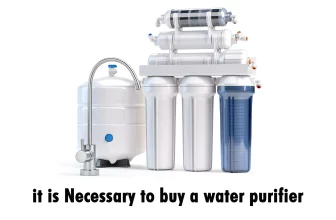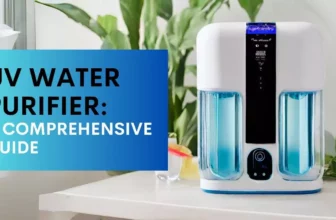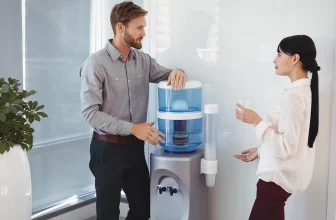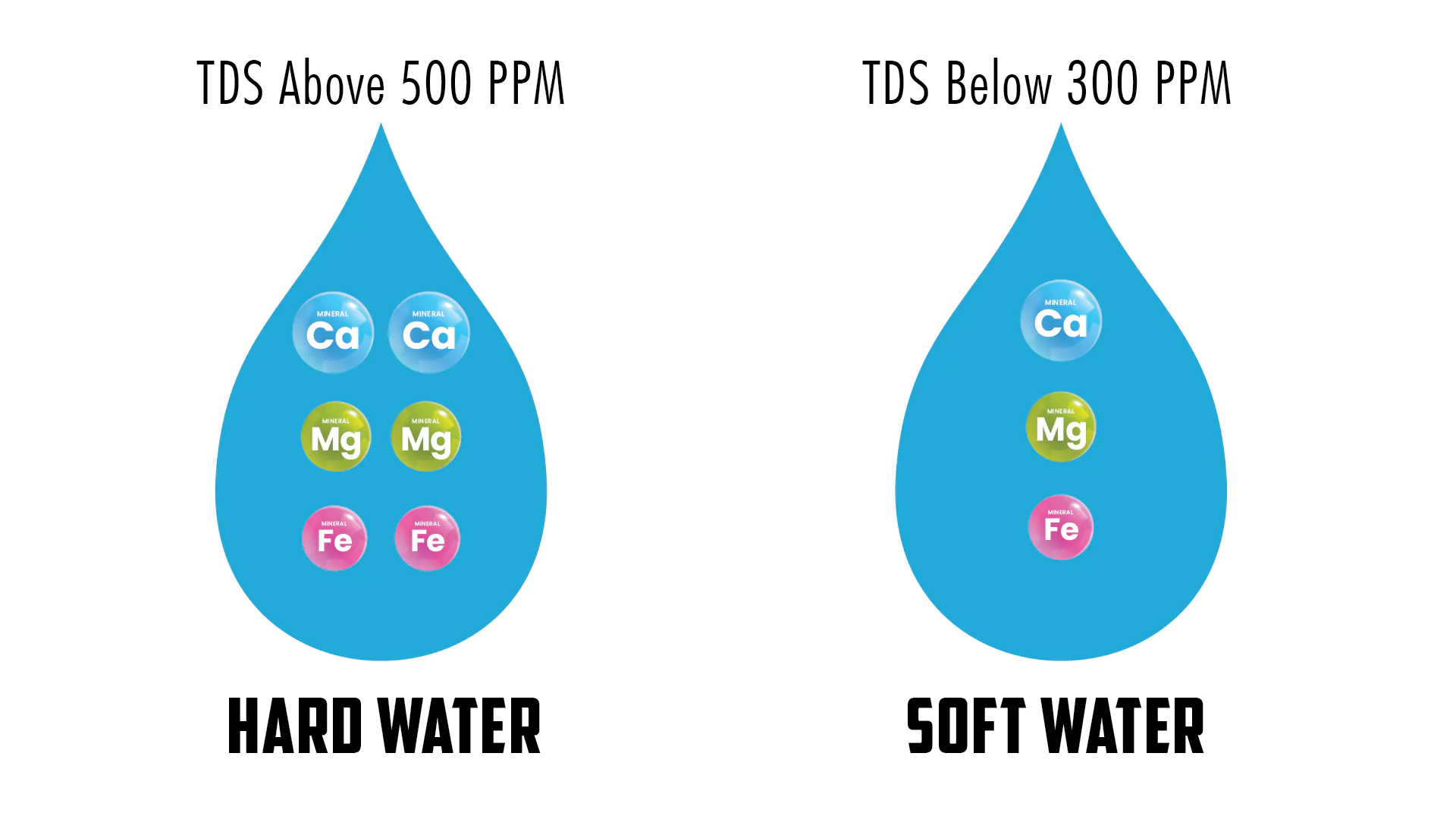
Hard water and soft water are two major concerns, especially when you need a water filter. So, if you are looking for a water purifier, you must understand hard and soft water. This article will show the primary differences between them and the most suitable water purifier according to your needs.
3 key features of hard and soft waters!
Hard Water:
- Mineral Content: Hard water is characterized by a high concentration of minerals, primarily calcium and magnesium ions.
- Scale Formation: Hard water tends to form scale deposits, leading to the accumulation of mineral deposits in pipes, appliances, and water heaters, reducing their efficiency over time.
- Soap Interaction: When mixed with soap, hard water forms soap scum, which can reduce the lathering ability of soap and result in the need for more soap for cleaning.
Soft Water:
- Low Mineral Content: Soft water has a low concentration of minerals, particularly calcium and magnesium ions.
- Scale Prevention: Soft water does not form scale deposits, helping to prevent the build-up of mineral deposits in appliances and plumbing systems.
- Effective Soap Usage: Soft water easily lathers with soap, requiring less soap for cleaning purposes and leaving no soap scum residues.
What is hard water?
Hard water is defined by the total amount of deposited particles of limestone, chalk, or gypsum in the water, as well as the amounts of dissolved metals or mineral particles, specifically calcium, ions, magnesium, and so on.
More importantly, hard water contains metal particles from factories and industrial waste in rivers. If your water is salty (minerals) or contains metals, it could harm your health; therefore, use an MTDS or RO combined water purifier to reduce or balance it by removing other harmful mineral particles and killing bacteria and impurities.
What is soft water?
Soft water is the opposite of hard water, which is without or with fewer minerals like calcium, magnesium, and certain other metal cations. The rainwater is completely soft until it does not get a mixture of atmospheric pollution, making it acidic.
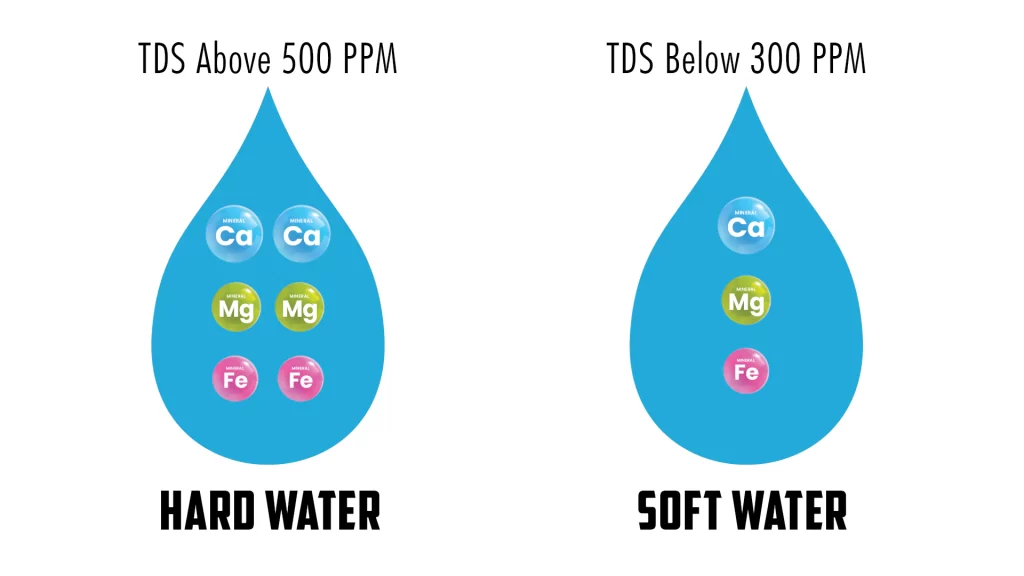
It contains relatively low ion concentrations and is low in calcium and magnesium ions in the water. Soft water is often used to describe water created by a water-softening process like an RO water purifier and other industry levels of treatment.
Must read, What is TDS in Water
Hard Water v/s Soft Water
| Characteristic | Hard Water | Soft Water |
|---|---|---|
| Mineral Content | High concentration of minerals, mainly calcium and magnesium ions | Low concentration of minerals |
| Effect on Appliances | Forms scale deposits that can damage appliances and reduce efficiency | Does not form scale deposits, extending the lifespan of appliances |
| Lathering with Soap | Forms soap scum, reducing lathering ability | Easily lathers with soap |
| Skin and Hair | May cause dryness and irritation to skin and hair | Leaves skin and hair feeling softer and smoother |
| Laundry | Can lead to dull and stiff laundry | Laundry appears brighter, softer, and cleaner |
| Stain Formation | Tends to cause stains on surfaces and clothing | Less likely to cause stains |
| Taste and Odor | Generally no impact on taste or odor | May taste better and lack any noticeable odor |
Which type of water, hard or soft, is considered better for drinking?
Healthy water intake involves consuming an adequate amount of clean and safe water daily. The recommended daily water intake varies, but a common guideline is around eight 8-ounce glasses, totaling about 2 liters or half a gallon. This ensures proper hydration, supports bodily functions, and aids in overall well-being. The quality of water is crucial, emphasizing the importance of choosing water free from contaminants. Ultimately, a balanced and mindful approach to water consumption, based on individual needs, climate, and physical activity, contributes to maintaining optimal health.
FAQ: Hard water and soft water!
Is hard water good to drink?
What is meant by hard water?
Which water is good—hard or soft?
Is rain hard or soft water?
What is PH value of hard and soft water?
Is rain 100% pure water?
Is river water hard?
Final Words
This article provides information about hard and soft water, helping you understand the characteristics of both. It explains how to identify hard water and discusses the differences, key features, and overall concepts related to hard and soft water. If you have any doubts, questions, or suggestions, please feel free to write to us, and our author will respond promptly.




